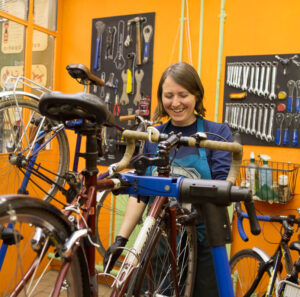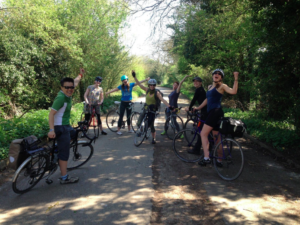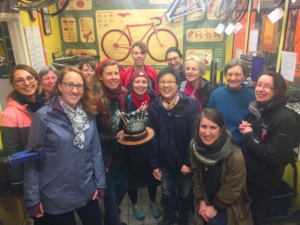The time we’re living through now encourages reflection. What is really important to us? What relationships, activities, and things do we actually need to keep us healthy and happy? What kind of community and society do we want to rebuild out of this…and what can we let go of? For many of us, living under lockdown has stripped away the patterns and routines of our normal lives and left us with space to rethink.
So we’ve been thinking…do community bike projects matter? Do we need them to weather this crisis and come back fighting? If the Broken Spoke is going to face down the bumpy road ahead we’re going to need some motivation – we need to remind ourselves and the world what the point is. To help, we’ve asked some close friends of the project to tell us what community bike projects like Broken Spoke mean to them. We’ve been hard hit by COVID and we need your support now more than ever. We hope these stories will inspire you to commit to a monthly donation to Broken Spoke to keep us going and allow us to continue our vital work in our community
This months story comes from Karen McCallum, brilliant long term volunteer at the Spoke until life took her back to Canada.
I have been obsessed with the idea of family and belonging for a very long time. I grew up listening to my grandparents’ stories about their childhoods and young adulthoods lived in Europe, before they immigrated to Canada. Is home what is familiar from childhood, or is home where you choose to consciously build your connections in adulthood? I often picked up on their ambivalence about where they belonged in these stories. In autumn 2013, I reversed their tracks, moving from Canada back to Europe, to the UK. I came with a long-term partner, knowing no-one else, and the first year was honestly quite painful and miserable. I missed my family, my friends. My grandparents were ill; the winter was rainy and cold, I missed the snow. Within the first year of my migration, this relationship folded and without it I really couldn’t picture how I would stay afloat in this new place. I found myself presented with the age-old question of whether to go back to the safety of ‘home’—the people you know, the familiar ways of doing business and greeting people—or to try to create home in the place you find yourself.
and greeting people—or to try to create home in the place you find yourself.
I had volunteered at bicycle coops before and loved it. So, I finally got around to dropping into the Broken Spoke. For a year, amidst studying, finding my feet, and teaching, I had meant to start volunteering at a bike shop again. I had volunteered for a year in university, Thursday mornings, at a lovely co-op where above all I learned to get comfortable with the tools, smells, and systems of a DIY bike co-op. I can’t imagine I was ever very useful to anyone, but I loved it. I loved touching hard, cold metal, and ghoulishly white internal bearing grease. I developed a love of wheel hubs that I have retained to this day—re-packing a hub and finding that perfect balance of tension so that the wheel spins without resistance, an even plane without play, gives me a quiet, satisfied feeling of a small victory won. File that in ‘simple pleasures’
Quite quickly after I started volunteering at the spoke in the autumn of 2014, I started to feel a sense of home that until that point had been elusive in Oxford. Volunteering in the shop filled so many holes for me. I enjoyed working on the bikes, honing my skills, sharing knowledge with others on the shop floor, taking the classes, teaching the classes, cleaning up the shop at the end of the day, sitting down and gripping a mug of coffee with greasy hands and begging people for just a minute before answering their latest query about a stuck bottom bracket or skipping chain. It gave me a sense of purpose and, for the first time since I had arrived in the UK, belonging. I  developed friendships that have calibrated the compass I use daily to judge and decide. I was moved and shaped by my experiences there as a teacher and student. There, I built a family.
developed friendships that have calibrated the compass I use daily to judge and decide. I was moved and shaped by my experiences there as a teacher and student. There, I built a family.
At the Broken Spoke I met people across the gender spectrum, from different immigration backgrounds, from all over the world. I met people who due to learning difficulties struggled to excel in some jobs, but whose devotion and depth of applied knowledge rendered them essential to the operation of the shop. I met people who were challenged when they were asked to take technical instruction from women. I met people who were misfits and nerds—my people!—people who loved to learn. People who gasped in awe at the inner-workings of a three-speed hub mechanism, tiny orbital arrangements of metal interfacing like a Swiss watch, offering smooth transitions and a mystifying lesson in engineering.
This kind of learning is essential because of its applied nature. Knowing how to fix your bike can be the ticket to all kinds of mobility. One of our volunteers was able to get a job because he was newly able to build a bike to take him there. I myself made about £16,000 a year back then, working one to three part-time jobs at any given point and studying full-time while I finished my PhD. Riding my bike, maintaining it myself, and using it to take me around the UK was the only chance I had to get out of the city to access leisure and adventure. The skills and knowledge we gained at the shop allowed me and many of us to overcome financial barriers and access vacation, adventure, and a sense of self-sufficiency.
Because they offer access to opportunities for learning, as well as the more literal sense of access that comes hand-in-hand with having access to an efficient method of transportation, bike shops like the Broken Spoke provide essential community services. When working well, they are safe places for non-academic, highly applied, learning. They are equalizing spaces because anyone can access them, but also because all types of learner and learning types are necessary and exercised—experiential learning as well as book-learning is valued and essential.
DIY bike shops can also offer a women, non-binary and trans people safer spaces to learn in STEM roles where they are underrepresented. When we organized Women & Bikes, we brought together the largest gathering of women in cycling that had yet to be held in the UK—proving a model that has since been replicated several times over. Women love mechanics! Did you know that? They love learning about the technical side of repairs, and they love competing. They love getting roughed up on a long ride, and  laughing about spills and near misses. Women love being in safe spaces where they can nerd out, get dirty, try hard, fail, and cycle it out. The Broken Spoke and DIY community spaces provide access to all people to explore and learn–a pleasure not always afforded this population in traditional bike shops.
laughing about spills and near misses. Women love being in safe spaces where they can nerd out, get dirty, try hard, fail, and cycle it out. The Broken Spoke and DIY community spaces provide access to all people to explore and learn–a pleasure not always afforded this population in traditional bike shops.
But, of course, communities need to do the work to be genuinely inclusive. This is true for the Spoke and for every single other community organization. We need to continually work to up-keep our commitment to inclusion and diversity. Being an ally, or having inclusive organizational practices, is not a state of identity or a port of arrival, but an active and ongoing process. We have more work to do to understand and clarify what it means to champion an anti-racist organization and space, and need to keep checking in on how other equity-seeking groups fare in the spaces we are co-creating. Organizing women and bikes, we endeavoured to organize workshops that spoke to the other intersections of people’s lives–bringing in speakers, and inviting guests from other underrepresented groups in cycling, such as women of colour, and persons with disabilities in cycling. Part of seeking an inclusive space for women and transwomen is also about being conscious of how, in making space for us, we can keep expanding the circle of who feels like they belong in our cycling community.
In late-2019, I moved home because my family life there was getting more complicated and I felt I had been away too long. In the months since I got home, so much has happened. We entered lockdown, responding to the pandemic that will define the year for us all, and then George Floyd was murdered, sparking the largest protests against racism and systemic police brutality since the 60s. When I started in 2019 announcing to people that I was planning to move back to Canada to be with my family, people almost universally accepted this—“yes, it is important to be near your family.” And yet even while I explained myself this way, it felt false to my own ears. Yes it is essential, but I was already with family.
As members of all sorts of sub-culture communities know—the queer community, immigrant diasporia communities, communities of persons with disabilities, the Black community—the concept of community is amorphous but also signifies ties of kinship and care. The idea says nevermind blood ties, you share specific experiences and insights. And those communities can become families, and those families can hold you up, challenge your beliefs, and need you. Just like in any family, you belong to them in part because of the energy you put in. When you invest your energy and time into them, you are contributing to a structure of your own creation. These kinds of structures of accountability and care are essential for a good community space to keep being of and for its members—safe, fun, interesting, and financially on its feet.
This family of the DIY bike co-op is real and valuable—a sentiment shared by members of bike co-ops around the world. This family is defined by inclusion and accessibility. It is important to have places where access to money does not define your capacity to learn, excel, or hold a position of leadership or authority, or where money does not stop you from accessing the freedom that comes from moving your own self around by bike. For many, this community space offers an authentic experience of connection. It is an exercise in communication skills, collective organizing, and collaborative visioning. In the wild world we live in now, characterized by run-away climate change, increasing divides between rich and poor, and the vicious effects of entrenched systemic racism, we need to invest in community spaces and strong connections that are deliberate and clear about promoting inclusion, rejecting the status quo, and meaningfully valuing the contributions of diverse members. Those are values you can build a functioning and responsible society around. Those are the values that made the Broken Spoke feel like home.
Karen McCallum
We’ve asked some close friends of the project to tell us what community bike projects mean to them, by creating a series of blog posts. We hope these stories will inspire you to commit to a monthly donation to Broken Spoke.
If you can’t commit to a regular donation, we still welcome anything you are able to give at this time. Your financial contributions can go a long way towards getting more people fixing & riding bikes.

